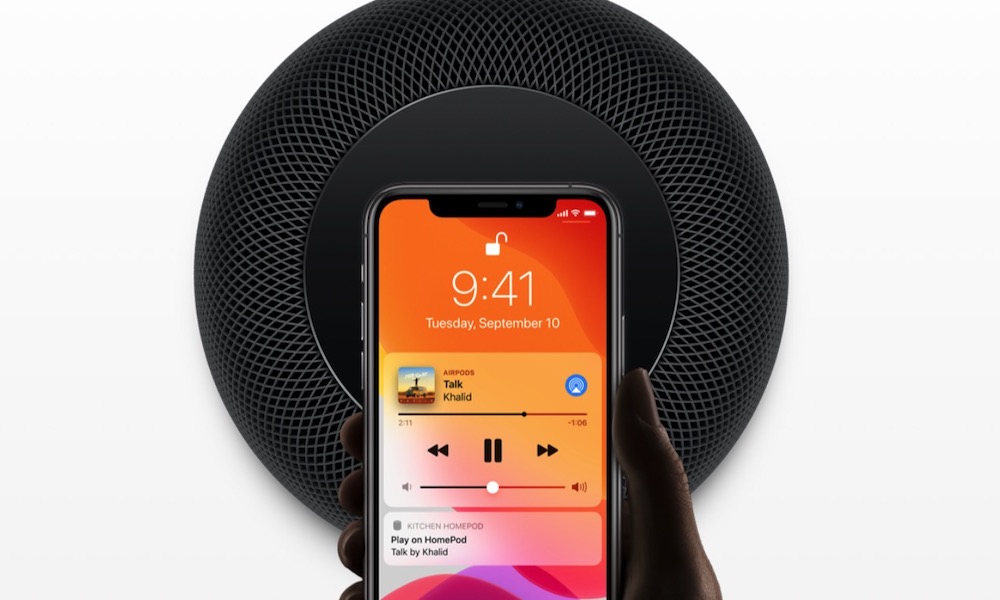Apple Quietly Moves HomePod to Using tvOS Instead of iOS
 Credit: Apple
Credit: Apple
Toggle Dark Mode
The HomePod has been somewhat of an enigma when it comes to the embedded operating system that it runs, since Apple has never really come right out and defined it particularly well. Early versions of the software updates simply referred to it with names like “HomePod 11.3” while making reference to iOS in the description field, while more recent releases in the iOS 13 era actually came right out and called it “iOS 13.x.”
That said, we’ve known all along that the HomePod basically ran a derivative of iOS, powered by Apple’s 2014-era A8 chip, however due to Apple’s somewhat schizophrenic naming conventions for its HomePod updates over the years, while we noticed that Apple went back to calling the latest one “HomePod Software Version 13.4,” we really didn’t give it much more thought.
Now, however, it looks like there may have actually been a reason for this change beyond the HomePod’s previous identity crisis. Digging into the latest HomePod firmware, 9to5Mac has discovered that Apple has quietly shifted it away from its iOS underpinnings, basing it now instead on tvOS — the operating system that’s been used on its Apple TV set-top box since 2015.
iOS vs tvOS
To be absolutely clear, tvOS is not a fundamentally different operating system from iOS. In fact, much like the new iPadOS, both tvOS and watchOS are derived directly from the same iOS foundation. This means at the core there’s not much difference, but at the higher levels, however, Apple adapts each one to the specific needs for their respective platforms.
For example, watchOS is obviously designed to be considerably more lightweight than a full iOS implementation, considering the device that it needs to run on. Conversely, tvOS doesn’t have to worry about things like power management, since it runs on a device that has no internal batteries and is always plugged in.
In fact, this would be one of the commonalities between the HomePod and the Apple TV right off the bat, so it’s understandable to see why tvOS might be a better fit for the HomePod than the mobile-optimized iOS.
What This Means
Right now, it’s unlikely you’re going to notice the difference between iOS and tvOS on the HomePod, however it does pave the way for Apple to do some things differently with its smart speaker, as well as likely making it easier to deliver a stable platform by removing components that really don’t need to be there.
Technically speaking, the HomePod should have gotten its own unique branch of iOS in the first place, but it likely wasn’t a significant enough device for Apple’s software engineering team to expend the energy to do so. However, the move to a tvOS base certainly makes a lot more sense for a number of reasons.
For one thing, both the Apple TV and HomePod also act as home hubs for HomeKit. Although this is a function that can also be handled by an iPad, meaning the code is also in iPadOS, it’s understandable how it might be implemented a bit differently in a tablet than in a device that stays in the home and is always plugged in.
Another interesting point that 9to5mac makes, however, is that there’s a good chance that iOS 14 will drop support for mobile devices that use the A8 chip. This includes only the iPhone 6 and iPhone 6 Plus, the sixth-generation iPod touch, and the iPad mini 4. The iPad Air 2, which uses the A8X, would likely also be on this list. As it stands, iOS 13 already dropped support for most of these devices, while iPadOS 13 continues to support the iPad mini 4 and iPad Air 2.
However, even as Apple is finally expected to launch another HomePod speaker, it’s unlikely to discontinue the current HomePod. The 2015 fourth-generation Apple TV (now known as the Apple TV HD) also still uses the same A8 chip as the HomePod, and although Apple is also expected to unveil a new Apple TV later this year, given the fact that its set-top boxes serve as valuable enough gateways to services like Apple TV+ to make it basically resurrect the 2012 third-generation Apple TV, we really don’t think the Apple TV HD is going away any time soon.
So getting the HomePod onto tvOS makes it easier to continue supporting it alongside the older Apple TV with a tvOS 14 update later this year that will continue to be powered by the A8 chip, plus it also makes it much easier for Apple’s software team to polish up the HomePod user experience and deliver new features.
Further, since the current HomePod seems to run just fine with the A8 chip, there’s no reason to believe that Apple may not continue to use this older chip in the new HomePod mini that now appears to be shaping up for release in the very near future. In fact, adding support to yesterday’s report, 9to5Mac also found code in the new HomePod 13.4 firmware that identifies not only one, but two new models of HomePod, and the fact that they’re already appearing in iOS 13.4, rather than iOS 14, suggests that they could both arrive sooner than this fall.






